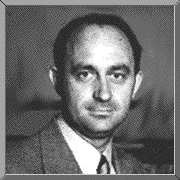 Enrico
Fermi was born in Rome, Italy on September 29, 1901.
He attended the University of Pisa. In 1926 he accepted a position as
a professor theoretical physics at the University of Rome. While at
this institution, he developed his theory of beta decay and
investigated artificial radioactivity.
Enrico
Fermi was born in Rome, Italy on September 29, 1901.
He attended the University of Pisa. In 1926 he accepted a position as
a professor theoretical physics at the University of Rome. While at
this institution, he developed his theory of beta decay and
investigated artificial radioactivity.
He moved to the United States of America and accepted a position as a professor of physics at Columbia University. During World War II he worked in New Mexico at Los Alamos and served as one of the developers of the first fission reaction, the atomic bomb project. After World War II, Enrico Fermi accepted a position as a professor of physics at the University of Chicago.
Enrico Fermi was awarded the Nobel Prize in physics in 1938 for his work in bombarding elements with neutrons to produce artificial radioactivity. Fermi died of cancer in 1954 in Chicago, Illinois.
References
Asimov, I. (1964). Asimov's Biographical Encyclopedia of Science and Technology: The Living Stores of More than 1000 Great Scientists from the Age of Greece to the Space Age Chronologically Arranged. Garden City, NJ: Doubleday.
Daintith, J. Mitchell, S., Tootill, E. (1981). A Biographical Encyclopedia of Scientists. New York: Facts on File.
Debus, A.G. (1968). World Who's Who in Science: A Biographical Dictionary of Notable Scientists from Antiquity to the Present. Chicago: Marquis.
Howard, A.V. (1951). Chamber's Dictionary of Scientists. London: Chambers.
McGraw-Hill (1966). McGraw-Hill Modern Men of Science. New York: McGraw Hill.
Taton, R. (Ed.) (1963). History of Science: Ancient and Medieval Science from the Beginnings to 1450. New York: Basic Books.